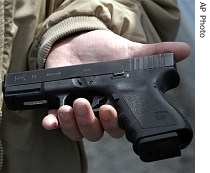2007年VOA标准英语-Worst Shooting Rampage in US History Raises Que(在线收听)
Washington
17 April 2007
Tuesday was a day of mourning for the 32 students killed and 15 others wounded at Virginia Tech University in the worst shooting rampage in U.S. history. But with the sorrow come questions, questions about the shooter, his motives and whether much can be done to prevent similar massacres in the future. VOA National correspondent Jim Malone has more from Washington.
Students, faculty, relatives and others gathered at a memorial service on the university campus in southwestern Virginia to pay their respects to those who died in Monday's shooting.
President Bush was among the mourners.
"In times like this, we can find comfort in the grace and guidance of a loving God,” said Mr. Bush. “As the scriptures tell us, do not be overcome by evil, but overcome evil with good."
Many Virginia Tech students remained in a state of shock. Some watched as their classmates were gunned down one-by-one, and wondered if they will ever make sense of what happened.
STUDENT: "A threat is one thing, but this is real and it makes me a little scared to go back on campus for my classes for the rest of the semester."
New details emerged about the alleged gunman, Cho Seung-Hui, a student from South Korea described by one university spokesman as a loner.
A fellow student, who calls himself Justin, did not know Cho well, but would occasionally see him walking on campus.
"I saw him a couple of times around campus, and he was usually really quiet, and I do not recall any memories that I saw him with anybody around him," he said.
Another student who shared classes with Cho told VOA's Korean service that Cho was very quiet, avoided eye contact, and resisted efforts by the class instructor to engage in conversation.
The mass shooting prompted colleges and universities around the country to take a fresh look at their security measures.
Edward Davis is police commissioner in Boston, Massachusetts, home to several prominent universities and colleges.
"I think it is important we have a conversation about this and review best practices, and see if there are any things that we should be doing differently," said Mr. Davis.
 |
| Roanoke Firearms owner John Markell holds a Glock 9 mm pistol similar to the one sold in his gun shop 36 days ago to the Virginia Tech shooting suspect Cho Seung-Hui |
Some of the calls to restart that debate came from overseas, especially Britain and Australia.
British Home Office Minister Tony McNulty studied at Virginia Tech University.
"If this does prompt a serious, reflective debate on gun ownership and gun law in the states, then some good may come from this woeful tragedy," he said.
U.S. gun control advocates said gun laws should be tightened to help prevent mass shootings in the future.
Dennis Hennigan is with the Brady Center to Prevent Gun Violence.
"We have gone in the opposite direction,” he said. “Not only do we have inaction, we actually have retrenchment on this issue, and it is high time that our national leaders heed the call of the American people that strongly support reasonable measures to curb this kind of random gun violence."
A leading gun rights group, the National Rifle Association, issued a statement on its Web site expressing condolences to those victimized by the shootings at Virginia Tech, and adding that it will have no further comment on the incident until all the facts are known.
The NRA Web site also contains interviews with gun owners worried that gun control groups are always pushing for new limits on firearms.
NRA WEBSITE: "Gun owners, we are paranoid for a reason. It is because we have been burned over and over and over again."
Another pro-gun group said that gun bans were the problem, and that Americans should have the right to arm and defend themselves.
Gun control advocates like New York Congressman Charles Rangel acknowledged they face an uphill climb in trying to tighten regulations.
"It is a regional thing, it is a cultural thing and it is a sad thing,” he said. “But it is some type of a cult, 'do not touch, do not take the gun from my dead, cold hands,' and I do not understand it."
Most lawmakers appeared to be holding off on the topic for now, as the nation mourned those who perished in Monday's attack.